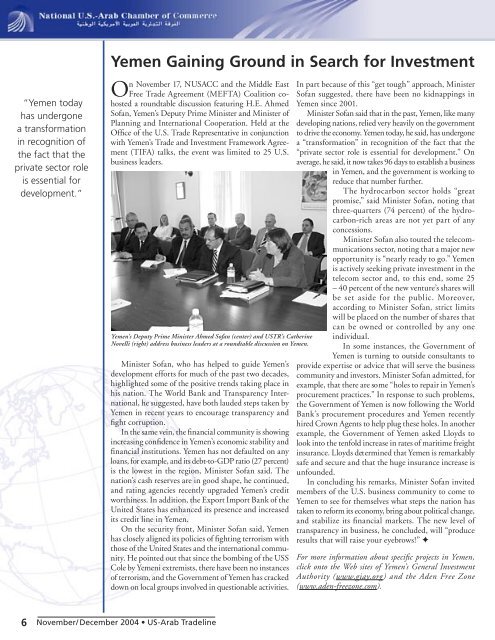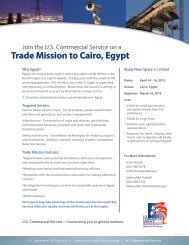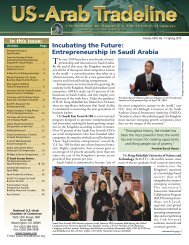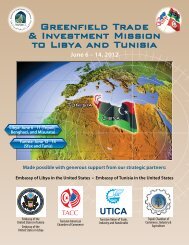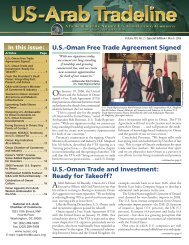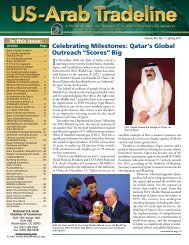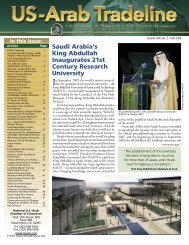“Yemen todayhas undergonea transformationin recognition <strong>of</strong>the fact that theprivate sector roleis essential fordevelopment.”Yemen Gaining Ground in Search for InvestmentOn November 17, N<strong>US</strong>ACC and the Middle EastFree Trade Agreement (MEFTA) Coalition cohosteda roundtable discussion featuring H.E. AhmedS<strong>of</strong>an, Yemen’s Deputy Prime Minister and Minister <strong>of</strong>Planning and International Cooperation. Held at theOffice <strong>of</strong> the U.S. Trade Representative in conjunctionwith Yemen’s Trade and Investment Framework Agreement(TIFA) talks, the event was limited to 25 U.S.business leaders.Yemen’s Deputy Prime Minister Ahmed S<strong>of</strong>an (center) and <strong>US</strong>TR’s CatherineNovelli (right) address business leaders at a roundtable discussion on Yemen.Minister S<strong>of</strong>an, who has helped to guide Yemen’sdevelopment efforts for much <strong>of</strong> the past two decades,highlighted some <strong>of</strong> the positive trends taking place inhis nation. The World Bank and Transparency International,he suggested, have both lauded steps taken byYemen in recent years to encourage transparency andfight corruption.In the same vein, the financial community is showingincreasing confidence in Yemen’s economic stability andfinancial institutions. Yemen has not defaulted on anyloans, for example, and its debt-to-GDP ratio (27 percent)is the lowest in the region, Minister S<strong>of</strong>an said. Thenation’s cash reserves are in good shape, he continued,and rating agencies recently upgraded Yemen’s creditworthiness. In addition, the Export Import Bank <strong>of</strong> theUnited States has enhanced its presence and increasedits credit line in Yemen.On the security front, Minister S<strong>of</strong>an said, Yemenhas closely aligned its policies <strong>of</strong> fighting terrorism withthose <strong>of</strong> the United States and the international community.He pointed out that since the bombing <strong>of</strong> the <strong>US</strong>SCole by Yemeni extremists, there have been no instances<strong>of</strong> terrorism, and the Government <strong>of</strong> Yemen has crackeddown on local groups involved in questionable activities.In part because <strong>of</strong> this “get tough” approach, MinisterS<strong>of</strong>an suggested, there have been no kidnappings inYemen since 2001.Minister S<strong>of</strong>an said that in the past, Yemen, like manydeveloping nations, relied very heavily on the governmentto drive the economy. Yemen today, he said, has undergonea “transformation” in recognition <strong>of</strong> the fact that the“private sector role is essential for development.” Onaverage, he said, it now takes 96 days to establish a businessin Yemen, and the government is working toreduce that number further.The hydrocarbon sector holds “greatpromise,” said Minister S<strong>of</strong>an, noting thatthree-quarters (74 percent) <strong>of</strong> the hydrocarbon-richareas are not yet part <strong>of</strong> anyconcessions.Minister S<strong>of</strong>an also touted the telecommunicationssector, noting that a major newopportunity is “nearly ready to go.” Yemenis actively seeking private investment in thetelecom sector and, to this end, some 25– 40 percent <strong>of</strong> the new venture’s shares willbe set aside for the public. Moreover,according to Minister S<strong>of</strong>an, strict limitswill be placed on the number <strong>of</strong> shares thatcan be owned or controlled by any oneindividual.In some instances, the Government <strong>of</strong>Yemen is turning to outside consultants toprovide expertise or advice that will serve the businesscommunity and investors. Minister S<strong>of</strong>an admitted, forexample, that there are some “holes to repair in Yemen’sprocurement practices.” In response to such problems,the Government <strong>of</strong> Yemen is now following the WorldBank’s procurement procedures and Yemen recentlyhired Crown Agents to help plug these holes. In anotherexample, the Government <strong>of</strong> Yemen asked Lloyds tolook into the tenfold increase in rates <strong>of</strong> maritime freightinsurance. Lloyds determined that Yemen is remarkablysafe and secure and that the huge insurance increase isunfounded.In concluding his remarks, Minister S<strong>of</strong>an invitedmembers <strong>of</strong> the U.S. business community to come toYemen to see for themselves what steps the nation hastaken to reform its economy, bring about political change,and stabilize its financial markets. The new level <strong>of</strong>transparency in business, he concluded, will “produceresults that will raise your eyebrows!” ✦For more information about specific projects in Yemen,click onto the Web sites <strong>of</strong> Yemen’s General InvestmentAuthority (www.giay.org) and the Aden Free Zone(www.aden-freezone.com).6 November/ December 2004 • <strong>US</strong>-<strong>Arab</strong> Tradeline
Roundtable at N<strong>US</strong>ACC Explores Reform andTerrorism in Saudi <strong>Arab</strong>ia“Envision yourselves in a museum in front <strong>of</strong> anancient tapestry that depicts a famous and mythicaltale <strong>of</strong> love and pain. Being old, it has one smallsquare inch at the bottom right-hand corner withfrayed threads. Imagine that a camera zooms ontothis square inch and projects it onto a screen the size<strong>of</strong> the original tapestry. And so, through the power<strong>of</strong> this medium, you have lost sight <strong>of</strong> the beautifulstory <strong>of</strong> the tapestry and you see only the negativeimage <strong>of</strong> the minute, frayed fault.”On October 7, N<strong>US</strong>ACC and the Center for InternationalPrivate Enterprise (CIPE) hosted aroundtable discussion on Reform and Terrorism in Saudi<strong>Arab</strong>ia. Mr. Amr Khashoggi was the featured speakerfor the event, which was held at N<strong>US</strong>ACC and attendedby upwards <strong>of</strong> 50 public and private sector representatives.Khashoggi is CEO <strong>of</strong> the Amkest Group in Saudi<strong>Arab</strong>ia and is a regular visitor to the United States.Khashoggi talked about internal pressures for reform,with more than 60 percent <strong>of</strong> the population under theage <strong>of</strong> 20, and external pressures, including those fromthe United States and Europe. Khashoggi noted thatAmr Khashoggi, CEO <strong>of</strong> Amkest Group, addressed a full house atN<strong>US</strong>ACC.many in the West seek to transform Saudi <strong>Arab</strong>ia intothe image <strong>of</strong> America and Europe. “I believe this iscounter-productive,” Khashoggi stated, “and it underminesthe efforts <strong>of</strong> Saudis who want to move the countryforward, yet not lose sight <strong>of</strong> the important role Islamand our historical traditions play in the development <strong>of</strong>the individual, the family, and society.”Khashoggi noted that steps have been taken towardreform in such areas as the media, labor, insurance,capital markets, and tourism. There are now greateropportunities for women in the workplace, he noted,and municipal elections are on track.“Everyone recognizes that we must progress, and wemust overcome the challenges facing our nation,”Khashoggi stated. “We need to come up with internallydeveloped solutions that are the result <strong>of</strong> national debateand that have gained what you in America would call‘buy in’ from a highly conservative population. Thisdebate will take time and must be based on open,transparent, and honest dialogue, and the extent <strong>of</strong> itwill dictate the speed and pace <strong>of</strong> implementing reformsin Saudi <strong>Arab</strong>ia.”On terrorism, Khashoggi noted that an environmentconducive to reform can only be maintained once matters<strong>of</strong> terrorism and internal security have been adequatelyaddressed.He outlined steps that the Saudi government hastaken to address terrorism, including:• Improving coordination among security agencies;• Freezing the assets <strong>of</strong> individuals and groupsdesignated as supporter <strong>of</strong> terrorism;• Instituting new banking policies and procedures;• Monitoring financial transactions; and• Instituting harsh penalties for money launderingand terrorism financing.Khashoggi noted that Juan Zurate <strong>of</strong> the U.S.Treasury Department’s Office <strong>of</strong> Terror Financing saidrecently that the “targeted actions undertaken by theKingdom have already produced tangible results, andthe systematic changes made by the Kingdom couldprove even more effective in defeating terrorist financingover the long term.”Khashoggi highlighted the fact that Saudi <strong>Arab</strong>ia isthe largest market for the U.S. in the Middle East, andSaudi private investment in the U.S. exceeds $500billion. “Saudi <strong>Arab</strong>ia is ranked the 25th largest importer/exporter worldwide,” he said, “and in 2002, trade betweenthe Kingdom and the U.S. amounted to $18 billion.U.S. companies are the largest foreign investors in theKingdom, with over 280 Saudi-U.S. joint ventures.”The United States and Saudi <strong>Arab</strong>ia “have been alliesand friends for 50 years,” Khashoggi observed. “Thetwo countries fought Iraqi aggression together in thefirst Gulf War and continue to cooperate after the falland capture <strong>of</strong> Saddam Hussein. The basis <strong>of</strong> ourrelationship is strategic cooperation, and we have a longhistory <strong>of</strong> successes.”Khashoggi expressed surprise at how little the Saudisand the Americans understand each other as people—even after all this time. “We need to reach out… tocommunicate with one another,” he noted. “It’s aboutbridging the gap <strong>of</strong> understanding, or bridging the gap<strong>of</strong> ignorance. We’re not there yet. Still, small steps arebeing taken in that direction.”“Let me close by saying that Saudi <strong>Arab</strong>ia and theU.S., despite what anyone might say, share many importantvalues and respect and understand each other’sdifferences. Let us not allow the likes <strong>of</strong> Osama BinLaden to succeed in driving a wedge between our twonations.” ✦Amr Khashoggi takes questionsabout reform and terrorism inSaudi <strong>Arab</strong>ia.“Everyonerecognizes that wemust progress, andwe must overcomethe challengesfacing our nation.”Amr Khashoggi, CEOAmkest Group <strong>of</strong> Saudi <strong>Arab</strong>iaNovember/ December 2004 • <strong>US</strong>-<strong>Arab</strong> Tradeline7


